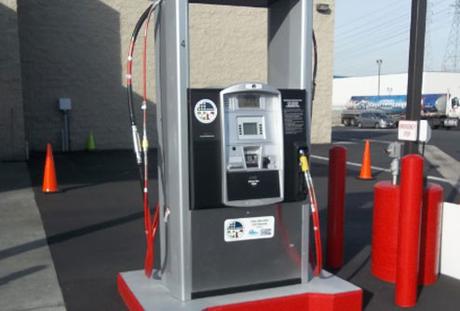 The difference two years can make. In 2013, in the face of rising fuel prices, diesel users were searching for alternative fuel sources. Natural gas was viewed by many as the most likely candidate. Cheap, plentiful and domestic, it would provide a reliable and dependable fuel source, at least to those fleet managers and carriers who invested in or decided to lease compressed natural gas (CNG) or liquefied natural gas (LNG) vehicles.
The difference two years can make. In 2013, in the face of rising fuel prices, diesel users were searching for alternative fuel sources. Natural gas was viewed by many as the most likely candidate. Cheap, plentiful and domestic, it would provide a reliable and dependable fuel source, at least to those fleet managers and carriers who invested in or decided to lease compressed natural gas (CNG) or liquefied natural gas (LNG) vehicles.
Two years later, as diesel levels off at historic low prices after an extended downward trend, many of those same managers are thinking twice about their available alternatives. Natural gas continues to win over converts. But momentum has slowed as many remain committed to diesel.
In fact, diesel and natural gas should both be part of a longer view of a policy of fuel diversification.
Many companies committed to natural gas vehicle deployment realize long-term economic and environmental benefits. U.S. production of natural gas is rising, as new sources are discovered and recovered nationwide. It’s widely available in both local and over the road markets. Product innovation means alternative fuel sources for commercial transportation, from the light- to medium-duty market or an entire portfolio, including passenger, light, medium and heavy commercial use, are finding their place beside traditional fuel sources.
As the U.S. becomes a leading natural gas producer, with stable supplies insulating the nation’s users from fuel cost swings, petroleum remains unpredictable. Diesel’s recent price drops notwithstanding, such pricing affects distribution costs, fleet operations and a company’s balance sheet.
Still, for many fleet managers, diesel understandably remains the most reliable, current solution.
The cost of conversion, for many, is an issue. To help offset such reluctance, occasional government rebates and tax incentive programs seek to encourage adoption by helping reduce customers’ natural gas vehicle costs and offer more competitive lease and rental rates. Ryder actively monitors public and private incentive programs throughout the U.S. and Canada and can help customers leverage those benefits.
Of course, not all fleet owners or carriers see “now” as the right time for conversion. For those customer interested in natural gas, but inclined to delay a commitment to the new technology, Ryder offers solutions that provide the flexibility now, with the agility to convert when the time feels right. Ryder’s Flex-to-Green lease, for example, enables customers to lease diesel vehicles now and later switch those vehicles out for a natural gas solution. Ryder’s natural gas Rental fleet also offers customers the ability to introduce advanced fuel technologies into their operation on a short-term basis while evaluating their options for longer term solutions.
Forces are aligned to encourage a conversation about fuel diversification. Dynamic oil prices, along with innovations in commercial vehicle technologies, together should open discussion across the North American heavy commercial industry, where an eye on the future leads to a strategy of energy diversification – with natural gas and diesel both playing key roles in any decision.
Written by Scott Perry
Scott Perry is Vice President, Supply Management & Global Fuel Products with Ryder System Inc. He is responsible for defining and managing vehicle and parts procurement strategy, corporate real estate and strategic infrastructure, , new vehicle technologies, as well as overseeing Ryder’s diesel products portfolio and advanced fuel program.

